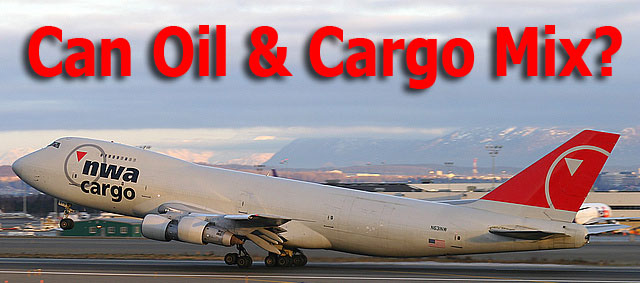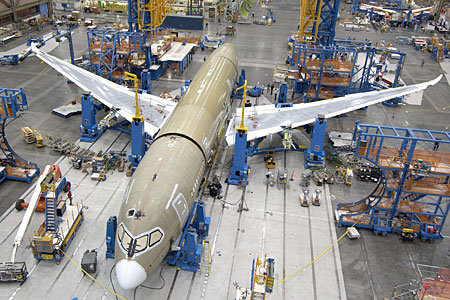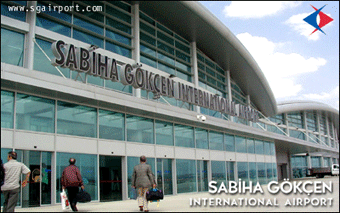|

.gif) “The
air cargo business is in for some real change treats,” says Michael
Boyd, of Colorado-based Boyd Aviation Associates. “The
air cargo business is in for some real change treats,” says Michael
Boyd, of Colorado-based Boyd Aviation Associates.
“That includes all sectors, including
logistics and distribution businesses tied to air freight.
“The range of commodities that make
economic sense being transported by air is going to be very different
in the future. "Different" meaning less, mostly.
“The air cargo pipeline's going to
get smaller, and some branches may dry up completely.”
As oil reaches toward $120USD a barrel and
beyond, alarm bells seem to be going off almost everywhere.
The quick take is that freighter guys working
on 2 to 3% may have finally hit a brick wall while the integrators with
their cushy yield protection will be all right.
 Bill
Boesch for the past 40 plus years has served the industry in top posts
including as President of American Airlines Cargo. Bill
Boesch for the past 40 plus years has served the industry in top posts
including as President of American Airlines Cargo.
Currently, he is deeply involved in building
a logistics system to support the effort in Iraq. He surveys the landscape
ahead for air cargo.
"I am not a pessimist but prefer to
search for the benefits of any given situation.
"But, the air cargo industry is going
through some horrific times that I believe will continue for the next
few years.
"Every index and most air cargo executives
I talk with are predicting poor air cargo industry results.
"Most agree that at the core of the
problem is unimaginable high fuel prices, but add to that the low dollar,
the poor economy, the lack of consumer spending and the EEC and DOJ paralyzing
industry pricing investigations have created what some people are calling
"The Perfect (Air Cargo) Storm".
"I see real problems for the operators
of freighters for a few reasons.
"The first is that all-cargo operating
costs are increasing as the cost of fuel increases. Many of the freighters
are converted older passenger aircraft, which are not very fuel efficient.
"Some operators are experiencing union
problems with employees asking for salary and benefit increases to reverse
years of cuts and givebacks post 911.
"All of this might be manageable if
a rising tide was lifting all ships.
"But, the problem is that in 2008 the
market overall is not growing very fast.
"Yields are down as economies stall
and surcharges have become a legal lightening rod.
"A major challenge to all cargo operators
in addition to everything else is that the belly carriers with lower cargo
carrying costs are continuing to hold down the rates to fill their capacity.
"Many of these operators are facing
large losses from their passenger operations and I believe will continue
to put pressure on cargo rates to fill their bellies to bring in much
needed revenues.
"While it is true that belly carriers
in most cases are unable to market the service delivery of a freighter
operator so many will continue to utilize price as a marketing tool.
"So what is the answer?
"I believe that this problem is now
bigger than the airlines’ ability to solve it.
" The governments of the world need
to recognize the importance of air cargo and put in short term regulations
to support the industry as everyone deals directly with the underlying
problems of air cargo economics and especially fuel prices.
"In USA to let the industry falter
and significantly consolidate may aid a few carriers, but the overall
effect of large unemployment and higher transportation prices for urgent
consumer cargo will have an increasing negative effect on the economy.
"The U.S. Congress should work toward
developing sponsorship of a comprehensive "Airline Recovery Bill"
which will reduce the effect of this Perfect Storm affording professional
air cargo managers a fighting chance.”
 At
Emirates SkyCargo, the fast rising flag carrier from Dubai has been fielding
a mixed ACMI (5) and company owned (5) all cargo fleet of B747-400 and
Airbus freighters operating in concert with its heavily cargo-centric
B777s and other passenger aircraft across expanding world routes. At
Emirates SkyCargo, the fast rising flag carrier from Dubai has been fielding
a mixed ACMI (5) and company owned (5) all cargo fleet of B747-400 and
Airbus freighters operating in concert with its heavily cargo-centric
B777s and other passenger aircraft across expanding world routes.
Latest company financials released just
last week underscore that somehow EK has managed to make it (to this point)
all profitable.
SkyCargo carried 1.3 million tons of cargo, up 10.9 per cent over 2006.
Revenue increased 20 per cent to AED 6.4
billion ($ 1.8 billion), up from AED 5.4 billion ($ 1.5 billion) in 2006-07.
Cargo revenue contributed 19 per cent to the airline’s total revenue.
Ram Menen, Divisional Vice President said:
“For all-cargo operators the current
business climate is delivering a double whammy.
“The effect of the high oil prices
combined with a very weak dollar has already created havoc with the U.S.
economy, slowing down growth in air cargo while widening the gap in directional
imbalances.
“On top of this for the airlines,
cost of operation has virtually doubled with fuel at almost 55-60% of
operating expense on freighters.
“The effect on the bottom line is
huge. “Those operating older equipment are hurting the most.
“I am certain that a lot of older
freighters will become unviable.
“Even with the higher yields my take
is that integrators are also hurting as well.”
Speaking of older freighters those B747-200s
operated by Northwest Airlines on routes from USA across the Pacific apparently
keep on lifting despite soaring fuel prices.
Although we requested comment from newly
named NW Cargo boss Tom Bach, as we go to press there had been no reply.
But one can reasonably surmise that despite
higher operating costs, NWCargo and the airline itself would be hard pressed
to drop freighters because right now cargo provides a significant portion
of the entire throughput.
In addition to a bunch of overly thirsty
freighters, Northwest will lose a significant portion of DHL Express freight—its
largest cargo account—in the fall of 2008.
Northwest by the way is the only U.S. carrier
that still has a dedicated cargo fleet, with 12 older Boeing 747 freighters
in operation.
What will be interesting to watch after
Delta takes over Northwest is how DL as a lifelong cargo belly operator
will address NW Cargo.
Expect DL CEO Richard Anderson who interestingly
held the same job at Northwest before switching to Delta less than a year
ago, and now is moving to have DL acquire Northwest, has already considered
the options.
One USA-based logistics expert sees it this
way:
“The market has turned.
“You have rates all over the place
to certain destinations.
“Fuel and security surcharges are
applied as needed, so that process remains unchanged.
“But freighters seem not directly
affected by all of this.
“Firstly the industry needs freighter
uplift to move cargo to meet TSA rules about known/unknown shippers.
“For the foreseeable future I don't
believe that carriers will take their freighters off the market.
“Too much export now.”
At Air France /KLM Cargo despite a keen
Franco/Dutch focus on the bottom line, reaction from spokesman Jean Claude
Raynaud include some words of amazement at the “skyrocketing increase
of fuel prices,” as “something one had not expected - at least
at this level and so suddenly.”
“For many airlines, all around the
world, an underlying factor in all of this is that older aircraft types
can be too expensive to fly!”
This month Air France and Boeing are throwing
a party to celebrate the world’s first B777F aircraft at a swell
ceremony and party in Seattle put up by Boeing that hopes it will help
sell even more twin jet freighters.
With near term delivery prospects for its
much-ballyhooed B787 heading straight for the crapper (see companion story
here) Boeing Commercial once again is facing some stiff criticism.
“No surprise,” JC continued,
“that some operators, in the U.S., and probably elsewhere around
the world, have decided to ground part of their fleet.”
“AF-KL, although preoccupied with
this situation, is lucky to feature a modern, fleet of aircraft—both
long and medium-range—that afford us a better chance to face down
the heavy fuel cost challenge.
“On AF side we were happy to put an
end to our B747-200F operations at the end of December 2007, as not being
profitable to fly anymore.
“The AF-KL Cargo fleet now includes
9 B747-400 ERFs (the most efficient freighter in the world, presently
flying) and 4 B747-400 BCFs.
“On top of that, AF Cargo (after having
been the 'launch customer' for the B747-400 ERF Extended Range Freighter
in October 2002) will again lead the way as the launch customer of the
brand new B777-200 LRF (Longer Range Freighter) in late October 2008.
“This aircraft will actually bring
additional performance & cost-effectiveness to our cargo activities
& fleet (we have ordered 5 of the type + 5 options).
“The B777 ERF will bring us one step
closer in our permanent search for cost-effectiveness, since that airplane
will indeed be at that time the most efficient freighter existing in terms
of costs savings, fuel consumption, efficiency and silence offering savings
of 17% in terms of better fuel-efficiency as compared to the present best
aircraft (the B747-400 ERF).
“Half of AF cargo is being carried
in the belly holds of our passenger aircraft.
“Here again, we are somewhere lucky
that our long-haul passenger fleet is comprised of newer high performance
aircraft such as the B777-300 ER and also the B777-200 ER, the A340-300
& A330-200.
“For now and into the future, application
of the Fuel Surcharge is an absolute ongoing fact of life!
“No airline in the air carrier world
could survive today if the fuel surcharge was not applied and regularly
adapted according to the increasing costs of the fuel!
“Fair to say that the level of prices
reached by fuel now are a major preoccupation and a big concern for all
of us!
“But just like everyone else as mentioned
at the top, all of us wonder where and when will these increases stop
or at least level off.”
Geoffrey
Faces
At CNS
Let’s face it,
right now through Wednesday Cargo Network Services (CNS) holding
their 18th Annual Partnership Conference at the PGA National Resort
in Palm Beach, Florida is the big story worldwide as the captains,
greats and near greats of the industry get together to meet and
network.
People have flown into Florida from
around the world.
We asked some of them:
Why are you here and what’s
important now?
 Clive
Langeveldt, Vice President, Mercury Air Cargo: Clive
Langeveldt, Vice President, Mercury Air Cargo:
“We are doing quite well but
just like many other people around the world we wonder what is going
to happen next?
“Everyday you hear things. Here
at CNS we have the opportunity to meet new people and greet old
friends and most importantly get a handle on what everyone else
thinks about the state of our industry right now.”
 Thomas
Huchler, Vice President USA Southeast and Southwest EmoTrans: Thomas
Huchler, Vice President USA Southeast and Southwest EmoTrans:
“Business is good but we wonder
when will the forwarder be able to count on a return for our services
of handling and collecting surcharges for the airlines?
“We operate over 250 network
locations worldwide with sales of over $1.5 billion.
“In USA, our 25 offices are
located throughout the United States, so CNS affords us great opportunity
in an atmosphere of congeniality to work with our partners to build
a better air cargo industry.”
 Jack
Lampinski, Managing Director Americas & George Baglieri, Operations
& Compliance Americas, Swiss WorldCargo. Jack
Lampinski, Managing Director Americas & George Baglieri, Operations
& Compliance Americas, Swiss WorldCargo.
“The dollar has driven our business
into overdrive and since our responsibility is outbound we are doing
everything we can to ramp up our service delivery to new heights
to make sure it continues.
“Very excited about our new
destinations in India and China, hearing a positive response as
we talk to our service partners.
“Concern is that uncertain economies
could have some impact ahead.
“But this is our first day here
so we are out to get some other opinions from our colleagues here.”
 Joe Reedy, American Cargo vice president
sales and marketing and John Vittas, Senior Vice President Market
Development and Customer Care Worldwide Flight Services tell it
like it is.
Joe Reedy, American Cargo vice president
sales and marketing and John Vittas, Senior Vice President Market
Development and Customer Care Worldwide Flight Services tell it
like it is.
“The opportunity to get together,
compare notes and see how we are doing for our customers is reason
enough to attend CNS Partnership.
John Vittas adds:
“We know that our customers
have plenty of choices. Here for a couple of days is the opportunity
to come forward and hear some unvarnished truth to the question:
“How are we doing?”
“I’ll second that,”
Joe Reedy adds.
“We have some important meetings
this week.”
 Nol
van Fenema, Publisher/Editor, Payload Asia at CNS, said that he
is busy setting up the next Air Freight Asia in Hong Kong September
8-10 2009. Nol
van Fenema, Publisher/Editor, Payload Asia at CNS, said that he
is busy setting up the next Air Freight Asia in Hong Kong September
8-10 2009.
“We are going to revolutionize
air cargo trade show conference sessions,” Uncle Nol declared.
“No twenty minute commercials
by panel speakers but rather sessions that bring the best and the
brightest around subjects of unique common interest.”
Lufthansa Cargo Group is at CNS this
week in force.
Asked why, the answer is direct from
this group of executives who left their Bratwurst for some Cinco
de Mayo
Chorizo and empanadas and fresh fish flown in, thanks to LAN Cargo
from Ecuador.
 “Networking was the word and
the food was no slouch either,” everyone agreed.
“Networking was the word and
the food was no slouch either,” everyone agreed.
(L to R) Christian Fink, Managing
Director, Lufthansa Cargo Charter Agency; Peter Ahnert, Director
of Business Development, Jettainer; Alexander Pluemacher, Managing
Director, Jettainer and Felix Keck, Managing Director, Traxon.
 “It’s
a beautiful bird,” said Stephen Dix senior director of sales
Global Aero Logistics of the new World Airways B747-400F that just
delivered a big consignment of air cargo for Lufthansa Cargo Charter
from Hong Kong. “It’s
a beautiful bird,” said Stephen Dix senior director of sales
Global Aero Logistics of the new World Airways B747-400F that just
delivered a big consignment of air cargo for Lufthansa Cargo Charter
from Hong Kong.
 “CNS,
like a successful ACMI operation, is about building relationships. “CNS,
like a successful ACMI operation, is about building relationships.
“We are down on the ground with
our customers as well as up in the air.”
World gets a second B747-400 later
this year to add to its fleet of MD11s and DC10s.
“We think that the best is yet
to come.”
Monika Lutz, CEO of Jet Airways and
Luis Paredes, President & CEO of Aeroxpress out in the cool
of the evening as Sunday night got going, at CNS agreed:
“What this gathering brings
to air cargo is understanding that face to face with opposite numbers
and business partners is an absolute requirement.
“CNS Partnership is the most
important gathering of the year.” |
Dreamliner Delay Nightmare
 As
you read this, a number of Boeing customers are receiving notice
from the U.S. manufacturer containing disillusioning news.
Once again Boeing announces a further
delay of the much-heralded B787 'Dreamliner' of up to 27 months
from the originally planned date of delivery. Affected
are the airlines that had planned to phase in the B787 not earlier
than 2012 or in the years after.
Among them are Spanish carrier Air
Europe, Gulf Air of Bahrain, Vietnam
Airlines and British Airways, too.
They had all placed their purchase
orders late last year or in early 2008 putting them well at the
end of the line of the 58 customer airlines that have decided to
buy the twin engine passenger jet.
"This announcement by the U.S.
manufacturer really blows our business strategy and affects very
negatively our future international route expansion concept,"
stated an executive that had placed a major order for the B787 airliner
last year.
Asked by Air Cargo News FlyingTypers
if the airplane producer had offered his enterprise any financial
compensation in the letter for breaching the contract he simply
said "none at all."
"To me this announcement clearly
shows that Boeing has no strategy or capacity for accelerating the
production rate of the B787 in the years to come.
“Otherwise the foreseeable backlog
in the manufacturing process of this aircraft, which we are severely
hit by, remains inexplicable."
"We principally do not comment
on any processes involving our customers," stated a Berlin-based
spokesperson of Boeing when confronted with her company's announcement
to the airlines by Air Cargo News FlyingTypers.
For the U.S. airplane producer the
consequences of these additional delays could be extremely costly.
Many clients might follow Qantas CEO
Geoff Dixon's example, who had already demanded financial compensation
on October 11, 2007.
At that date, Boeing had admitted
only a six-month delay in its planned initial delivery of the 'Dreamliner'.
Then, April 9, Boeing came up with
a revised concept, telling the stunned public that the first flight
of the B787 is scheduled for the end of 2008 instead of the second
quarter, and that launch customer All Nippon Airways will get its
first airplane in fall 2009 instead of the first quarter of that
year as promised.
Boeing though is in 'good' company
since rival Airbus is also facing major delays of their mammoth
A380 program. According to sources close to the
European airplane producer A380 costs have soared to well above
€3 billion Euros.
One bright note, sort of, the first
B777 freighter left Boeing's factory in Everett, Washington on Tuesday
night.
Now, the plane will be prepared for
flight tests.
Launching customer Air France Cargo
will receive the first B777F in the final quarter of 2008, confirmed
Boeing in a release.
So far the manufacturer has orders
for 78 B777F from eleven customers worldwide, among them German
Aerologic GmbH (11), LAN Chile (4) and U.S. leasing company Guggenheim
Aviation Partners (6).
Heiner Siegmund |
Notes From
The E-Freight Underground
If reality is understanding
e-freight and compliance thereafter, than it is probably fair to suppose
that while movement toward e-freight for air cargo is making large strides
as opposed to baby steps these days, the new process for many is still
operating somewhere under the radar in air cargo.
Put another way, to some all this talk of
a new way to eliminate paper work from air cargo may still seem as distance
as .99 cent a gallon gasoline in the USA.
But undaunted a major effort to change things
continues, while a closer look reveals that a new discipline for air cargo
that was once thought impossible is steadily bubbling up to the surface.
 To
hear IATA Cargo tell it, the initiative to do a power cut away from paper
is the Topic-A part of an intensive effort to revamp the way air cargo
does business before the industry finally buries itself underneath a daily
avalanche of paperwork. To
hear IATA Cargo tell it, the initiative to do a power cut away from paper
is the Topic-A part of an intensive effort to revamp the way air cargo
does business before the industry finally buries itself underneath a daily
avalanche of paperwork.
According to Mr. Guillaume Drucy, IATA Head
Of E-Freight, the e-freight effort while no walk in the park, is well
underway and producing some positive and expansively hopeful results that
can impact air cargo today and when further implemented, change the playing
field forever.
“The vision of IATA e-freight is to
eliminate the need to transport paper documents for air cargo shipments
by moving to an industry-wide, simpler, electronic and paper-free environment.
“Twenty years ago it took 6.5 days,
on average, to send a shipment internationally.
“Despite numerous advances in the
transportation industry, today it still takes 6.0 days ... 1 day to fly,
5 days for other tasks, including waiting for paper and paper processing.”
IATA Cargo insists that out of the gate,
industry benefits of e-freight are reduced costs, improved customer service,
more rapid security compliance and overall savings, among other things.
Upon full implementation, the initiative
is projected to bring savings of US$1.2 billion per year.
IATA e-freight is currently conducting pilots
in Germany (Lufthansa), Canada (Air Canada), the Netherlands (AF-KLM),
Hong Kong (Cathay Pacific), Singapore (Singapore Air), Sweden (SAS) and
the UK (British Airways).
The Pilots were launched in November 2007.
“What we have learned so far is that
e-freight is possible!!
“Currently shipments are monitored
and moving with no showstoppers.
“Moreover some 70% of these monitored
shipments go without pouch/envelope.
“But the scope of possible shipments
needs to be expanded to allow volume ramp-ups and also to include transit
and transhipments.
“Happy to report that the airlines
are ready to pump-up volumes, but forwarders need more preparation and
more standards delivered to enable a more scalable process.
“With respect to our Pilot Program
the key learnings so far is that although we have global e-freight operating
procedures (e-FOPs), there remains a local element that requires attention.
“Each location/stakeholder must conduct
legal/regulatory due diligence in relation to the e-freight operating
procedures.
“Also stakeholders must be certain
that archiving requirements are in line with e-freight scope.
“Our key advancement goals ahead in
2008 for e-freight will continue to use the Pilot Programs as test bed
for new standards and e-FOPs expansion in transit and transshipments,
E-AWB (shipment record), and further development toward the full removal
of AWB paper.
“We will also continue development
of electronic standards for invoices, packing list and certificate of
origin, as well as EAW/EAP e-freight Special Handling Codes (SPHs) in
Forwarder Messages (FWBs), while we progressively ramp-up volumes en-route
to establishing full e-freight capability.
“Beyond our current Pilot Program,
IATA plans to implement e-freight in 7 new locations (countries).
“Another key ingredient to be realized
in 2008 is delivery of an e-freight implementation and methodology and
a working e-freight “toolkit” for the industry.”
Geoffrey

 In
Turkey, Istanbul's
second airport with our favorite name for an airport, Sabiha
Goekcen (SAW) was officially transferred to the new
owners on May Day. In
Turkey, Istanbul's
second airport with our favorite name for an airport, Sabiha
Goekcen (SAW) was officially transferred to the new
owners on May Day.
Limak
(Turkey), GMR (India),
MAHB (Malaysia) will
run the airport for 20 years.
Also
the civil aviation authorities of Turkey and Russia
signed a new civil aviation agreement between the two countries opening
up destinations from 5 to 10 and allowing Turkish and Russian cargo
companies to fly each to other’s market freely.
Turkish
flag carrier THY including
private companies will be allowed to fly to current Russian destinations
of Moscow, Ekaterinburg,
St. Petersburg, Rostov,
Kazan as well as new destinations such as Krasnodar,
Omsk, Novosibirsk,
Sochi, and Ufa.
Both authorities also agreed to cooperate
and work closely on ground handling, aircraft maintenance, engineering
and other technical matters. |

 Here
is that first B777 freighter
rolled out April 30 in Seattle, Washington for testing as soon as
Boeing can apply some
of its snappy livery. Here
is that first B777 freighter
rolled out April 30 in Seattle, Washington for testing as soon as
Boeing can apply some
of its snappy livery.
Ever notice
how livery sharpens up an airplane, even an old one?
But
with the price of kerosene some of those sharp looking, older cargo
aircraft (passengers varieties as well) are little more than pigs
wearing lipstick.
Boeing has high
hopes for B777F and will deliver the first one to launch customer
Air France this fall. |


|
Feliz Cinco de Mayo!
On May 5,1862, France at war with
Mexico, attacked City of Puebla where two forts blocked the advance
of the French troops.
Before the day was over, one of the
forts was destroyed and the Battle of Puebla went to Mexico.
The battlefield is now a city park,
with a statue of General Zaragoza, Mexico’s hero of the encounter
on horseback near a war museum.
Cinco de Mayo is celebrated as a national
day of celebration in both Mexico and USA.
As CNS meets in West Palm Beach, Florida
this week we raise our glass May 5.
Feliz Cinco de Mayo!
|
|



